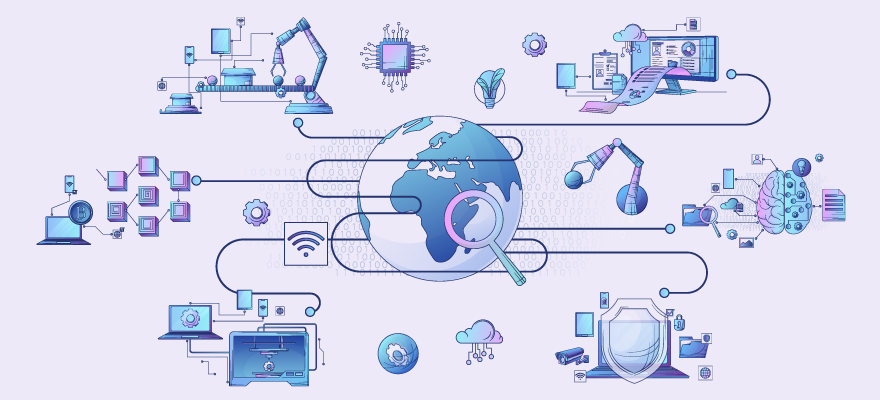How AI is Transforming Industries and Shaping the Future
- Geraldo

Artificial intelligence (AI) has emerged as a game-changer in the digital era, transforming the way we live, work, and interact with technology.
The applications of artificial intelligence are vast and varied, encompassing numerous industries and sectors. From healthcare and finance to transportation and entertainment, AI is revolutionizing every aspect of our lives.
In this article, we will delve into the intriguing world of AI and explore its wide-ranging applications, highlighting how it is shaping the future and driving innovation across industries.
Applications of Artificial Intelligence
Artificial intelligence has found its way into countless domains, offering innovative solutions to complex problems and revolutionizing traditional processes. Let's take a closer look at some of the key applications of artificial intelligence:
1. Healthcare
AI is making significant strides in the healthcare industry, enhancing diagnostics, treatment, and patient care.
With its ability to analyze vast amounts of medical data, AI-powered systems can assist in the early detection of diseases, predict patient outcomes, and optimize treatment plans.
Moreover, AI-based virtual assistants and chatbots enable patients to access personalized healthcare information and receive timely assistance.
2. Finance
In the financial sector, AI is transforming the way we manage money, detect fraud, and make investment decisions.
Intelligent algorithms can analyze financial data, identify patterns, and predict market trends with remarkable accuracy. AI-powered chatbots are also becoming prevalent in customer service, providing real-time support and personalized recommendations to clients.
3. Transportation
AI is revolutionizing transportation by enabling autonomous vehicles and optimizing traffic management systems.
Self-driving cars equipped with AI technologies can navigate roads, detect obstacles, and make real-time decisions, leading to enhanced safety and efficiency on the roads.
Additionally, AI is utilized in logistics and supply chain management to optimize routes, reduce costs, and streamline operations.
4. Education
In the field of education, AI is transforming the learning experience for students and educators alike.
Intelligent tutoring systems can adapt to individual student needs, providing personalized learning paths and feedback. AI-powered chatbots and virtual assistants assist students in finding resources, answering questions, and guiding them through their educational journey.
5. Entertainment
AI has also made significant inroads into the entertainment industry. Recommendation systems powered by AI algorithms suggest personalized content to users, making entertainment platforms more engaging and tailored to individual preferences.
Additionally, AI is used in content creation, such as generating realistic computer-generated imagery (CGI) and developing immersive virtual reality (VR) experiences.
6. Agriculture
AI is increasingly being employed in agriculture to improve crop yields, optimize irrigation, and manage pests and diseases.
Smart farming systems equipped with sensors and AI algorithms can monitor soil conditions, weather patterns, and crop health, allowing farmers to make informed decisions and maximize productivity.
AI-powered robots are also being developed for tasks like harvesting and weed control.
Frequently Asked Questions about the Applications of Artificial Intelligence
How is artificial intelligence used in healthcare?
AI is used in healthcare to improve diagnostics, predict patient outcomes, and assist in treatment planning. It can analyze medical data, such as imaging scans and patient records, to aid in the early detection of diseases and provide personalized care.
What role does AI play in finance?
AI plays a crucial role in finance by analyzing financial data, detecting fraud, and predicting market trends. It also enhances customer service through AI-powered chatbots that provide real-time support and personalized recommendations.
How is artificial intelligence shaping transportation?
Artificial intelligence is shaping transportation by enabling autonomous vehicles that can navigate roads, detect obstacles, and make real-time decisions. It also optimizes traffic management systems, leading to safer and more efficient transportation networks.
What are the benefits of AI in education?
AI brings numerous benefits to education, including personalized learning experiences through intelligent tutoring systems. It also assists students in finding resources, answering questions, and receiving guidance, enhancing their overall learning journey.
How does AI impact the entertainment industry?
AI has a significant impact on the entertainment industry by powering recommendation systems that suggest personalized content to users. It is also used in content creation, such as generating realistic CGI and developing immersive VR experiences.
How can AI improve agriculture?
AI improves agriculture by optimizing crop yields, irrigation practices, and pest management. Smart farming systems equipped with sensors and AI algorithms monitor soil conditions, weather patterns, and crop health, allowing farmers to make informed decisions and maximize productivity.
Conclusion
The applications of artificial intelligence are vast and transformative. From healthcare and finance to transportation and agriculture, AI is revolutionizing industries and driving innovation.
With its ability to analyze vast amounts of data, make predictions, and automate processes, AI has become an indispensable tool for solving complex problems and enhancing efficiency.
As technology continues to advance, the potential of AI seems boundless, promising a future where intelligent systems augment human capabilities and pave the way for new discoveries and advancements.
Unlocking the power of artificial intelligence opens up endless possibilities, offering solutions to long-standing challenges and transforming the way we live and work. Embracing AI's potential allows us to harness its capabilities for the betterment of society and shape a future that is smarter, more efficient, and more inclusive.